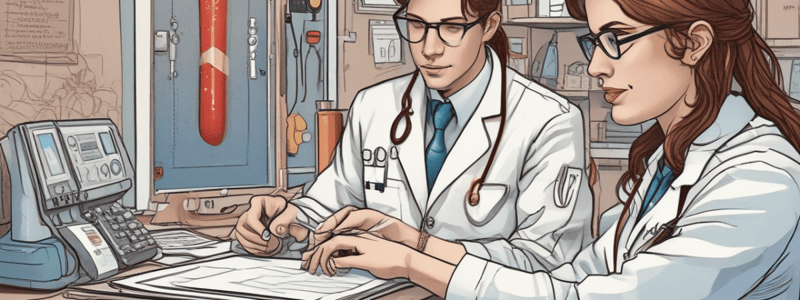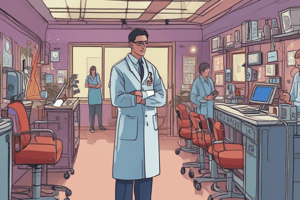Podcast
Questions and Answers
What is a key component of successful phlebotomy?
What is a key component of successful phlebotomy?
- Effective supervision
- Effective technology
- Effective communication (correct)
- Effective documentation
Why is it important for a phlebotomist to communicate effectively with patients?
Why is it important for a phlebotomist to communicate effectively with patients?
- To simply follow hospital protocol
- To decrease patient anxiety (correct)
- To impress other healthcare professionals
- To increase workload
What type of vocabulary should a phlebotomist use when communicating with patients?
What type of vocabulary should a phlebotomist use when communicating with patients?
- Complex medical terms
- Slang
- Simple vocabulary (correct)
- Jargon
What is an important aspect of nonverbal communication in phlebotomy?
What is an important aspect of nonverbal communication in phlebotomy?
Why is it important for a phlebotomist to be aware of their zone of comfort when interacting with patients?
Why is it important for a phlebotomist to be aware of their zone of comfort when interacting with patients?
What is an important aspect of telephone etiquette in phlebotomy?
What is an important aspect of telephone etiquette in phlebotomy?
What is an element of healthcare communication that is important for phlebotomists to practice?
What is an element of healthcare communication that is important for phlebotomists to practice?
Why is it important for a phlebotomist to manage their appearance and conduct when interacting with patients?
Why is it important for a phlebotomist to manage their appearance and conduct when interacting with patients?
What is the preferred tone to use when speaking with a caller?
What is the preferred tone to use when speaking with a caller?
What is the polite way to place a caller on hold?
What is the polite way to place a caller on hold?
Why should you avoid using abbreviations and medical jargon?
Why should you avoid using abbreviations and medical jargon?
What is the rule regarding personal cell phones when dealing with patients?
What is the rule regarding personal cell phones when dealing with patients?
What is the goal when interacting with a patient?
What is the goal when interacting with a patient?
How should you close a call?
How should you close a call?
Flashcards are hidden until you start studying
Study Notes
Communication in Phlebotomy
- Communication is the imparting or exchanging of information.
- Phlebotomists interact with many different types of patients and customers base their perception of the healthcare facility on the employee who deals with them.
Communication Skills
- Effective communication is a key component of successful phlebotomy.
- Prepare the patient adequately to ensure a smooth process.
- Use simple vocabulary and avoid complex medical terms.
- Explain special test requirements clearly (e.g., semen analysis, GTT, 24-hour urine collection).
- Listen carefully and provide feedback to patients.
- Communication is a two-way process; allow patients to ask questions and answer them courteously.
- Be sensitive to parents/guardians' feelings when dealing with minors.
Nonverbal Communication
- Nonverbal communication involves transmitting messages or signals through:
- Eye contact
- Facial expressions
- Gestures
- Posture
- Phlebotomists work in the intimate zone (1-18 inches) to perform venipuncture.
- Patients are often more aware of the phlebotomist's touch, which can be conveyed in a thoughtful and caring way.
Zone of Comfort
- The zone of comfort is the amount of space people feel necessary to set between themselves and others:
- Intimate: 1-18 inches
- Personal: 1 ½ - 4 feet
- Social: 4 – 12 feet
- Public: More than 12 feet
Elements of Healthcare Communication
- Empathy
- Control
- Respect and confirmation
- Trust
Telephone Techniques and Etiquette
- Answer incoming calls as quickly as possible.
- Be friendly and professional:
- Greet callers with a good morning/afternoon
- State the name of the business or department
- Provide your name
- Ask how you can assist
- Use an appropriate volume and speed when speaking.
- Be polite when placing callers on hold; ask for their permission.
- Use non-technical language and avoid abbreviations and medical jargon.
- Listen attentively to determine the best way to assist.
- Close calls in a friendly and professional manner.
Phlebotomist and Cell Phone
- Follow company restrictions on cell phone use.
- Give 100% attention to the person in front of you.
- Avoid taking personal calls or texts when dealing with a patient.
- Keep your personal phone on silent if you have it with you.
Studying That Suits You
Use AI to generate personalized quizzes and flashcards to suit your learning preferences.




